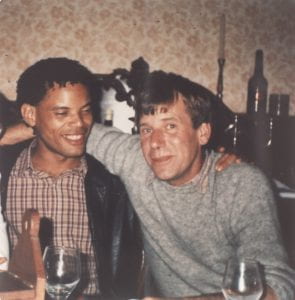Archiving HIV/AIDS in Melbourne
Adapted from an article by Michael Graf and Russell Walsh Michael in UMA Bulletin : News from the University of Melbourne Archives : Issue 35, December 2014. The full article is available here.
Collections held at the University of Melbourne Archives (UMA) offer insight into the partnerships between government, health professionals and Melbourne’s gay community, during the HIV/AIDS epidemic in Australia.
1979 saw increased visibility and social acceptance for gay men and lesbians, evidenced by the fifth National Homosexuality Conference taking place in Fitzroy. But that same year, Terry Stokes, a University of Melbourne student, was arrested in Collins Street for kissing another man. Stokes’ subsequent eviction from Graduate House prompted Julian Phillips, then Senior Lecturer in Law, to act as his legal counsel. Primary documents from the Julian Phillips Collection outline the controversial details of the Stokes case and its repercussions within the University and across Melbourne.
Professor David Penington, a clinical haematologist and the University’s Dean of Medicine, held key national positions during the early years of the epidemic, including Chair of the AIDS Task Force. His collection not only offers candid insights into decision making at senior levels during the crisis, but also indicates in its vastness the scale of the tasks facing government, health professionals and affected communities at the time.

The John Foster Collection provides an intimate perspective of the gay community in Australia in the 1980s and 1990s. Foster, a Lecturer in History at the University, wrote the widely acclaimed Take Me to Paris, Johnny, a sober account of his relationship with dancer Juan Cespedes, a Cuban refugee whom he met in New York in the early 1980s. Cespedes came to Australia to live with Foster before dying of AIDS in 1987. Foster also died of AIDS in 1994, a year after his account of Cespedes’ life and death was published. UMA holds a large body of Foster’s and Cespedes’ papers, many of which describe the complications of Cespedes’ illness and eventual death. The Foster Collection also includes several drafts of the book and copious notes.

Michael Graf is a Melbourne based visual artist.
Russell Walsh trained in art history at the University of Melbourne. His doctoral research in Performance Studies was undertaken at Victoria University.
Further reading:
Transmissions: Archiving HIV/AIDS, Melbourne 1979-2014 https://www.afao.org.au/wp-content/uploads/2017/06/TRANSMISSIONS-and-Vital-Signs-A-glimpse-of-two-exhibitions-staged-during-AIDS-2014.pdf
“When kissing was a crime” by Andrew Trounson, University of Melbourne, 2017 https://pursuit.unimelb.edu.au/articles/when-kissing-was-a-crime
“There has been us”: John Foster and Juan Cespedes
https://blogs.unimelb.edu.au/librarycollections/2021/06/28/there-has-been-us-john-foster-and-juan-cespedes/
Homosexuality and the University of Melbourne, Graham Willett and Kathy Sport
https://archives.unimelb.edu.au/resources/subject_guides/homosexuality-and-the-university-of-melbourne
Categories
- Uncategorised
- Special Collections
Leave a Reply